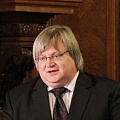- We have determined possibility of dynamic control of refraction diagram of metal-dielectric antennas. This opens potential for creation of ultra-fast optical switches with switching time of just 40 femtoseconds.
- We have developed and developed and experimentally implemented (in the microwave frequency range) a general concept of dynamically reconfigurable metamaterials based on pioneering approach of changing illumination of the object by a remote external source.
- Our Laboratory has found a way to increase sensitivity of magnetic resonance imaging using endoscopes made of metamaterials. We have established a Small Innovative Enterprise «MEGA-MRI» where we currently actively developing devices based of metamaterials for usage in medicine, in particular in MRI and child orthopedics. As a result, we have developed several useful problems of endoscopes for reducing time of MRI scanning.
- Our researchers have developed metasurfaces to amplify signals in MRI scanner that allowed to at least double the signal/noise ratio of images. On the basis of these technologies we have created a prototype of a wireless coil for MRI scanning of limbs.
- We have experimentally proven existence of a new class of optical analogues of topological insulators where electromagnetic radiation can be propagated instead of electrical current on the surface. This type of insulators can be used in optical chips, communication lines and quantum computers.
- Our researchers have demonstrated possibility of creating a super-fast optical transistor from just on silicon nanoparticle. Results of this work can be later used in developing optical computers where transistors should have an ability for ultra-fast switching and increased compactness.
Implemented results of research:
Developed concepts and theories allow for more thorough analysis of characteristics of metamaterials and possibility of controlling these materials which is the key to creating practical devices based on metamaterials (masking surfaces, superlenses, devices for collecting and processing information and many other applications).
Education and career development:
- We have organized a Physics and Technology Faculty on the basis of the International Research Center for Nanophotonics and Metamaterials. The Laboratory is currently running 3 masters programs («Metamaterials», «Photonics of dielectrics and semiconductors» and «Radio frequency systems and devices») and 1 bachelors program («Nanophotonics and quantum optics»). There are 46 postgraduates studying at the faculty who major in «Optics», «Radiophysics», «Condensed state physics».
- We have launched the Department of Nanophotonnics and Metamaterials at the Saint Petersburg National Research University of Information Technologies, Mechanics and Optics – ITMO.
- The Laboratory runs the annual «Doctoral Summer School on Nanophotonics and Metamaterials» for young researchers.
Other results:
- Input-output system for radiation featuring three independent optical channels and supplementary optical and mechanical elements for attacking a scanning probing microscope to a microspectrometer (AIST-NT TrIOS).
- Multipurpose probing device for complex nanoscale research of optical materials AIST-NT.
- Echo-free chamber.
Collaborations:
- Australian National University (Australia): joint research in dielectric and hybrid nanostructures and antennae for applied biophotonics and for working with single NW-centers, student exchanges, double postgraduate school programs
- EH Zürich (Switzerland): joint research joint research in dielectric and hybrid nanostructures and nanoantennas for applied biophotonics
- Leiden University (the Netherlands): joint research to develop metadevices for MRI scanning
- Aalto University (Finland): joint research in developing metasurfaces for MRI scanning and wireless transfer of energy as well as research in developing nanostructures for solar energy, student exchange, double postgraduate school programs
- Technical University of Denmark (Denmark): joint research is controlling characteristics at subwave scales using reconfigurable metasurfaces and single optical nanoantennas
- Ioffe Physical-Technical Institute of the Russian Academy of Sciences (Russia): joint research of Fano resonance in photonics as well as developing a three-dimensional submicron additive technology to create hardware components fir photonics, base department




